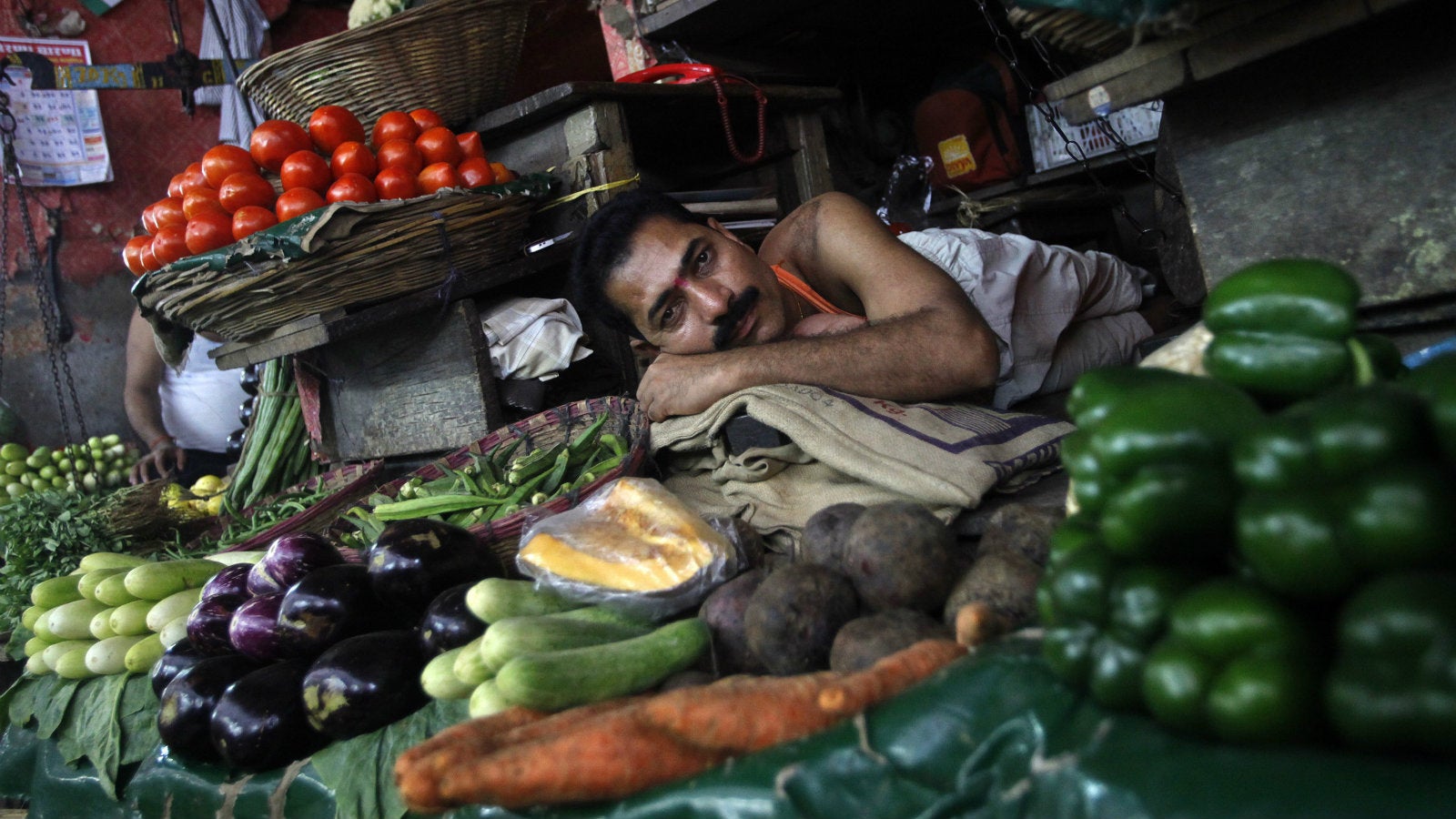Weekly Indian shopping list: Husband likes ladyfingers, wife baby corn. Both choose bitter gourd
Bollywood glamour queens sauntering through congested Indian vegetable markets would be a sight to behold. That doesn’t ever happen, though, as shabby and crowded as these places mostly are. Nevertheless, the stars often get invoked by raucous vendors eager to woo customers.


Bollywood glamour queens sauntering through congested Indian vegetable markets would be a sight to behold. That doesn’t ever happen, though, as shabby and crowded as these places mostly are. Nevertheless, the stars often get invoked by raucous vendors eager to woo customers.
“Fresh tomatoes, folks…as red as Katrina’s (Kaif) cheek.”
“Didi, even Madhuri’s (Dixit) fingers aren’t as nimble as these beans.”
“The cucumbers are fresh and crispy…just like Alia (Bhat).”
Yeah, it is almost always the heroines, rarely the male stars. To be fair, it isn’t established if likening ginger to Hrithik Roshan’s extra thumb, onions to Salman Khan’s ever-peeling shirts, or tinda (apple gourds) to John Abraham’s Rs10 crore derriere has ever wooed shoppers.
And needless to say, being on the right side of that mercurial shopper is not easy. Like the layers of a cabbage, there are so many things that they—male or female, sometimes even together—must unravel before a purchase: the requirement at home, freshness of the stock, prices and rebates, and even whether polythene carry-bags available.
“The tantrums they throw over a Rs200 shopping list are worse than those of two-bit movie stars. Some half jokingly even ask if the palak (spinach) has plastic coating just because it is too green and fresh. But then customer is god, so we just hear her out,” Sonu Gupta says, struggling to be heard over the din caused by the shouting match in the market and the October rain outside. The 28-year-old, along with his two brothers, runs a small stall in a mid-sized vegetable market on the southeastern outskirts of Thane district in the state of Maharashtra.
Gupta, who begins his workday at around 5am, makes an average profit of around Rs1,500 on a day’s wholesale purchase of Rs5,000. This is after paying off Rs250 as rent for his stall, Rs160 per kilo of polythene covers, and other food expenses.
As Gupta speaks to Quartz, a middle-aged woman engages his brother Rahul in an argument over capsicum prices. Clearly not buying his reasoning, nor his capsicum, the woman turns to bhindi (ladyfinger) and puts into practice that annoying Indian habit: breaking each ladyfinger’s nib to ascertain its crispness before tossing it into the weighing vessel. This one routine alone reduces the daily income of the Gupta brothers by almost Rs100.
“Most people who come to us have no clue how to identify fresh stock, but they pretend they are born farmers. The problem is they end up mishandling and ruining our stuff,” Gupta says, removing the not-so-fresh brinjals (eggplant) from display.
Manoj Tiwari, another vendor, refers to another peculiar practice: the refusal to buy anything that is already on display, insisting instead on pulling out the reserves. The assumption being that the best is always hidden away from sight for more worthy customers.
A few are simply clumsy. Looking for “good” stuff, they compulsively pull vegetables from the bottom of the pile. And then all hell breaks loose as the entire lot tumbles down. The vendor has to then gather everything, even as customers queue up, often squashing tomatoes or lemons inadvertently under their feet.
“Most people simply round off the bill total to the previous whole number. So if it has come to, say, Rs185, they just hand us Rs180—and this is after having secured discounts on individual items,” 32-year-old Tiwari says, adding that the privileged ones are also the most parsimonious in such cases.
Weekends can be the worst as couples venture out, Tiwari says, partly in jest. “Just yesterday there was this young, well-off duo. The husband wanted bhindi, the wife insisted on baby corn. They refused to take the easy way out and buy both. So, to save a mere Rs20, they reached a compromise before me: karela (bitter gourd). It’s not that they couldn’t afford both bhindi and baby corn. It was merely their ego clash spilling out in public.”
Then there are the local goons who simply pay for just half of what they buy and walk away, says Gupta, even as the dampness under the tarpaulin-asbestos roof of the marketplace intensifies due to the rain. Most Indians are used to the mixed smell of wet mud and rotting vegetables, or else one could have termed it nauseating.
As Gupta lists the day’s rates, a little boy manning a nearby stall raises a shrill, threatening call: “Look, brothers, we’re running out of radishes. Don’t complain later on that you missed out on the best radishes in the market today.”
He didn’t use any body-part imagery for this one. Small mercies.
We welcome your comments at [email protected].